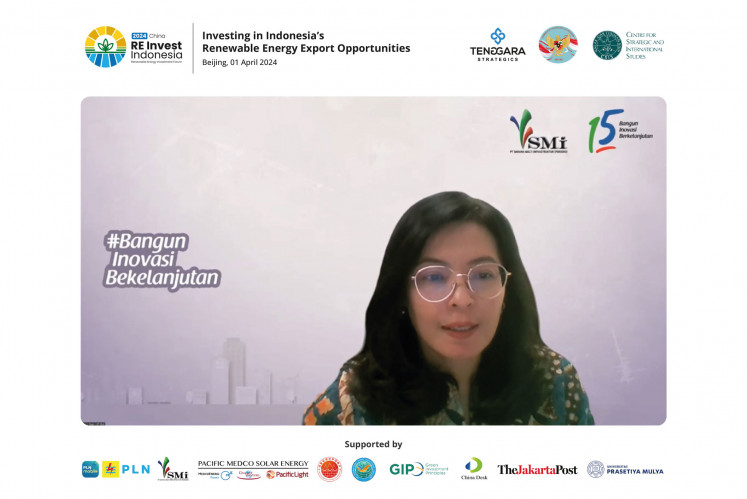Indonesia pursuing deregulation to raise investments
Change Size

I
nvestment Coordinating Board (BKPM) chairman Thomas Lembong said the continuous efforts of the Indonesian government to improve the investment climate have paid off, as has been indicated by the increase of its economic output during the last three years.
“Indonesia has managed to improve its business climate and its ranking in the ease-of-doing-business global competitiveness index. Indonesia has in fact achieved a lot in the last four years. The Indonesian economy today is 20 percent larger than when President Joko “Jokowi” Widodo took office in late 2014. Last year, we became the number 16th country in the world’s history to cross $1 trillion per year in GDP [gross domestic product]. So, over the last three years, our annual economic output has gone from $830 billion per year to $1 trillion. That is a very sizeable increase in annual economic output,” he told Shoeb Kagda in a special interview during the HSBC Infrastructure Forum recently.
However, he said that to continue generating higher economic output in the era of digitalization and migration of economic activity into the online realm, Indonesia and other countries have to deregulate fast enough to survive the current economic situation and grow even stronger.
“If we don’t deregulate fast enough, if we don’t modernize our regulations, our laws, our tax regime, our own people will move into the informal economy online. That is easier and easier for our people to do as economic activity shifts online where it becomes harder and harder for us to even track it or even detect it, so billions of citizens around the world have a very viable alternative to the poorly regulated, often corrupt formal sector,” the BKPM chairman said.
He said the real challenge for Indonesia and potentially for every country in the world in the era of digitalization and the migration of economic activity into the online realm is that it has to continue deregulating. “So, for me, it’s a battle to claw back or to incentivize our people and our businesses to stay in the formal sector by making the business climate and the regulatory climate user friendly enough, consumer friendly enough and just realistic in the context of consumer demand, especially millennial and Gen Z who have almost no tolerance for nonsensical regulations and irrational policies. So, we have to be realistic and adjust our laws, rules and regulations, our way of treating consumers and businesses in accordance to what they want,” he said.
On the world economy, he said for the next three years the big challenge is for the major central banks in the United States, Europe and Japan to allow their economies to grow higher. In addition to that, it is also urgent for the world to address the problem of
too dependence with the US dollar. The world’s over dependence on the US dollars has placed an undue burden on the US and created dangerous risks on the world’s financial system.
“We are finally seeing decent wage growth and household income growth in the US, Europe and Japan and it’s feeding through into consumption and restoring household savings in the advanced economies,” Thomas said.
“It’s also drawing in imports from developing countries, which sends hard currency to the developing countries. Socially, the wage growth and household income growth are also helping reduce inequality in the developed countries, which is a highly desirable phenomenon. Frankly, the only one that will be faced with slightly negative repercussions is corporate profit as companies may see heightened labor costs. But from my perspective, the corporate sector in the advanced economies has been enjoying disproportionately high profits for many years now and it’s time for a healthy rotation in terms of the division of the pie back toward workers and households.
“Personally, I credit the perseverance of major central banks in advanced economies for getting the world this far. First, they had to resist incredible political attacks that warned that the monetary stimulus would lead to hyperinflation and other problems. Secondly, they have had to be incredibly progressive in the way they modeled the likely forward path for inflation and debt levels or the impact of fairly high debt levels or the deflationary effect of technology.”
According to him, four to five years ago the real threat was the deflation that had worried the world at that time. The central banks should be highly appreciated for their success solving the problem of deflation and in raising wages in advanced economies amid the high levels of debt.
“So, the biggest threat to the world economy, I would argue, is not trade wars but premature tightening by the world’s major central banks, choking off what is currently a very healthy reorientation away from corporate profits toward household income growth, which is a win-win-win for just about everyone,” he said.
The increase of household income in the developed economies will in turn raise the exports of the emerging economies to the developed ones, while the higher inflation will help the indebted economies in easing their debt burdens.
“Higher income, higher spending and higher nominal economic growth will make it significantly easier to repay huge debts in the advanced economies,” he said. (*)









